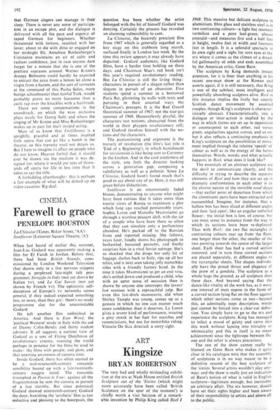CINEMA
Farewell to grace
PENELOPE HOUSTON
La Chinoise (Times, Baker Street, `AA') Sunflower (Leicester Square Theatre, 'A')
When last heard of earlier this summer, Jean-Luc Godard was apparently making a film for El Fatah in Jordan. Before that,
there had been British Sounds, com- missioned by London Weekend Television (but shown only in a few nervous snippets during a perplexed late-night talk pro- gramme), Struggle in Italy (not yet shown by Italian Tv), and Le Gai Savoir (not yet shown by French Tv). The optimistic self- deception of Europe's TV networks seems general, if they indeed expected something less, or more, than they got : there's no ready programme slot for the unassimilable Godard.
He left another film unfinished in America. And there is East Wind, the `political Western' made in Italy with the aid of Danny Cohn-Bendit and thirty student advisers. It all suggests a curious view of Godard as a sort of Flying Dutchman of revolutionary cinema, roaming the world perhaps in penance for the films he used to make: the films with people, and plots, and that unerring awareness of camera time.
Inside Godard, there has often seemed to be a mid-nineteenth-century romantic sensibility bound up with a late-twentieth- century magpie mind. The romantic triumphed in Pierrot le Fou: against alt the fragmentation he sent the camera in pursuit of a lost eternity. But since polemical Godard showed nineteenth-century Godard the door, banishing the 'aesthetic' film as too seductive and pleasing to the bourgeois, the question has been whether the artist belonged with the bit of himself Godard was denying. Certainly the process has revealed an alarming vulnerability to cant.
La Chinoise, the bizarrely prescient film from 1967 which is generally regarded as a key stage on this stubborn long march, surfaced finally in London last week. By the time this review appears it may already have departed: Godard audiences, like Godard films, have a harder time holding on these days, and Chairman Mao's red book isn't this year's required revolutionary reading. But La Chinoise is still the living thing: characters in pursuit of a slogan rather than slogans in pursuit of an obsession. Five students spend a summer in a borrowed Paris flat, plastering its walls with texts and pursuing in their assorted ways the Chairman's precepts. It is the Red Guard theoretical summer of 1967; not the tear-gas summer of 1968. Humourlessly playful, the characters test notions, abstracted from the world in their playpen revolutionary cell; and Godard involves himself with the no- tions and the characters.
The pantomiming and argument is the nursery of revolution (the film's last title is `End of a Beginning'), in which banishment for revisionism is like being sent to Coventry in the kitchen. And in the cool tenderness of the style, one feels the director looking across a generation gap, composing a valedictory as well as a polemic. Since La Chinoise, Godard hasn't found much that's good to say about any of us. Here, it was still grace before didacticism.
Sunflower is an uncommonly faded bloom, demonstrating to anyone who might have been curious that it takes more than tourist views of Russia to reanimate a plot which long ago reached pensionable years. Sophia Loren and Marcell° Mastroianni go through a wartime peasant idyll, with the air of a couple who have been there so often that they can simulate only a perfunctory
abandon. He's packed off to the Russian front and reported missing. She follows, years later, fondly shows his photograph to beshawled, bemused peasants, and finally surprises him in a rival Soviet menage. She's so shocked that she drops her only bit of luggage, dashes back to Italy, rips up all her relics, and is next seen taking jolly motorbike rides with a friendly factory hand. In the
time it takes Mastroianni to get an exit visa, she's settled down and produced a child, who
with an apter sense of occasion than is shown by anyone else interrupts the lovers' last reunion with a reproachful yelp. But even this last-ditch manoeuvre, old when Shirley Temple was young, comes up as a gesture in which no one can muster much more confidence than it deserves. La Loren gives a severe kind of performance, wearing a grey streak in her hair for searches and renunciations, but not for motorbike riding. Vittorio De Sica directed; a sorry sight.






























 Previous page
Previous page